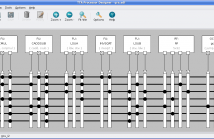
The IEEE Global Conference on Signal and Information Processing (GlobalSIP) is a flagship conference of the IEEE Signal Processing Society. GlobalSIP'15 will be held in Orlando, Florida, USA, December 14-16, 2015. The conference will focus on signal and information processing with an emphasis on up-and-coming signal processing themes. The conference will feature world-class speakers, tutorials, exhibits, and sessions consisting of poster or oral presentations. Outstanding papers will be selected for Best Paper Awards or Best Student Paper Awards; a paper is eligible for a best student paper award if the first author of the paper is a student. IEEE Signal Processing Society and National Science Foundation will provide travel grants to eligible students.
- Read more about Locally Linear Low-rank Tensor Approximation
- Log in to post comments
- Categories:
 4 Views
4 Views- Read more about Effect of Noise Variance Estimation on Channel Quality Indicator in LTE Systems
- Log in to post comments
EffectNV.pdf
- Categories:
 11 Views
11 Views- Read more about On the Particle-Assisted Stochastic Search in Cooperative Wireless Network Localization
- Log in to post comments
Cooperative localization plays a key role in location aware service of wireless networks. However, the statistical-based estimator of network localization, e.g., the maximum likelihood estimator (MLE) or the maximum a posterior (MAP) estimator, is commonly non-convex due to the nonlinear measurement function and/or the non-Gaussian disturbance, which complicates the localization of network nodes. In this paper, a novel particleassisted
- Categories:
 3 Views
3 Views- Read more about Opportunistic Beam Training with Hybrid Analog/Digital Codebooks for mmWave Systems
- Log in to post comments
- Categories:
 32 Views
32 Views- Read more about Detection of False Data Injection Attacks in Smart Grid Communication Systems
- Log in to post comments
The transformation of traditional energy networks to smart grids can assist in revolutionizing the energy industry in terms of reliability, performance and manageability. However, increased connectivity of power grid assets for bidirectional communications presents severe security vulnerabilities. In this paper, we investigate Chi-square detector and cosine similarity matching approaches for attack detection in smart grids where Kalman filter estimation is used to measure any deviation from actual measurements.
- Categories:
 7 Views
7 Views- Read more about Multi-User MIMO-OFDM for Indoor Visible Light Communication Systems
- Log in to post comments
- Categories:
 8 Views
8 Views
- Categories:
 6 Views
6 Views
- Read more about On the Energy Efficiency of Opportunistic Access in Wireless Home Networks
- Log in to post comments
In this paper, we evaluate the energy efficiency of opportunistic channel access when used in wireless home networking applications. The main idea is to prioritize the access rights of the wireless home applications sharing a given IEEE 802.11 channel. A low priority network can opportunistically access the channel during the inactive periods of a high priority network.
- Categories:
 2 Views
2 Views